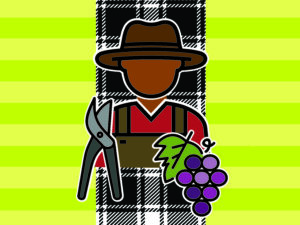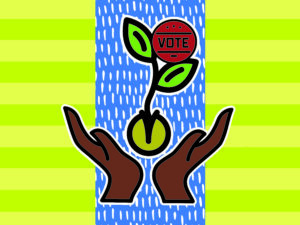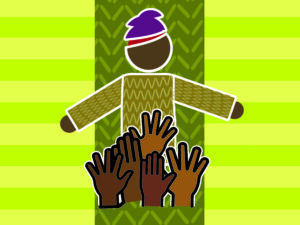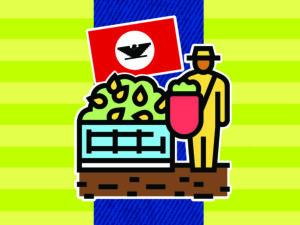Todos Unidos: Celebrating Farmworker Activism Past and Present
- by bonappetit

National Farmworker Awareness Week (NFAW) is a week of action that honors farmworkers for the critical role they play in our society while raising awareness about issues affecting them and their families. For almost a decade, Bon Appétit Management Company has been celebrating NFAW in partnership with Student Action with Farmworkers on our campuses.
This year, our theme Todos Unidos: Farmworker Activism Past and Present highlights a diverse set of activists that have fought for the rights of farmworkers throughout our history. From Fannie Lou Hammer to Cesar Chavez, these figures have empowered farmworkers and serve as inspiration to us today.

Larry Itliong
Predominantly known for spearheading the Delano Grape Strike during the 1960s, Larry Itliong was a Filipino-American labor leader who organized West Coast farmworkers to demand minimum wage for workers. He has been described as “one of the fathers of the West Coast labor movement” teaming up with labor leaders Cesar Chavez and Dolores Huerta to fight for farm workers’ rights.
The Delano grape strike is most notable for the effective implementation and adaptation of boycotts, the unprecedented partnership between Filipino and Mexican farmworkers to unionize farm labor, and the resulting creation of the United Farm Workers (UFW) labor union, all of which revolutionized the farm labor movement in America.
- Interesting Links:
- State of California recognizes October 25 – Larry Itliong Day
- UFW Article
- PBS Video

Fannie Lou Hamer
American civil rights activist, Fannie Lou Hamer, worked most of her life as a fieldworker starting at the age of six years old. She worked as a sharecropper picking cotton in Mississippi but was fired when she registered to vote.
She later led voting drives and in 1964 Hamer helped found the Mississippi Freedom Democratic Party, then in 1971 helped establish the National Women’s Political Caucus.
A statue for Fannie Lou Hamer now lives in the Fannie Lou Hamer Memorial Garden in Ruleville, MS and beneath a tombstone engraved with one of her most famous quotes: “I am sick and tired of being sick and tired.”
Learn more about Fannie Lou Hammer.

Harriet Tubman
Best known for her work as the “conductor” of the Underground Railroad, Harriet Tubman served as a scout, spy, solider, and nurse for the Union Army during the Civil War. Although she did not create the Underground Railroad – as many believe – she utilized it to escape and helped dozens of enslaved Black people, including farmworkers, follow suit, never losing a “passenger.”
Throughout her lifetime, she worked tirelessly to end the enslavement of Black people and aided Elizabeth Cady Stanton and Susan B. Anthony in promoting women’s suffrage. She is one of the earliest, central figures to the abolitionist movement, which still continues to this day in the United States.
Learn more about Harriet Tubman

Dolores Huerta
Dolores Clara Fernandez Huerta, co-founder of the United Farm Workers’ (UFW) Union, has a long history of labor and civil rights activism. She started her career as an activist by co-founding a chapter of the Community Service Organization (CSO) and the Agricultural Workers Association. She worked with César Chávez to organize farmworkers together in a larger organization that would later become the UFW where she served as Vice President until 1999.
Amongst her long history of activism, she helped organize the 1965 Delano strike of 5,000 grape workers and also helped negotiate contracts that advocated for safer working conditions and the elimination of pesticides. Her work continued with a consumer boycott of grapes in 1973 that led to the California Agricultural Labor Relations Act of 1975 as well as continued lobbying for representation of farm workers, women, and people from Latin America generally to political office.
She has received the Eleanor Roosevelt Human Rights Award and the Presidential Medal of Freedom.
Learn more about Dolores Huerta

Bacilio Castro
The fight for farmworkers continues to this day and isn’t limited to the fields. Bacilio Castro experienced now told horrors in the poultry industry, which has equally been built on the backs of workers who earn low wages, suffer high rates of injury and illness, and have little voice to change things themselves. He works with the Western North Carolina Workers’ Center to inform poultry workers about their rights.
According to Bacilio, “The mission and vision of the center is to empower workers, because they have power when they are united. To fight for the rights of workers and to not be afraid of their immigration status. Because in this country, all workers have rights.”
More work can be done. Take action to demand fair, safe working conditions for poultry workers.
Read more about Bacilio’s experience working in a processing factory

Nan Freeman
Nan Freeman was a passionate social justice activist who strongly identified with the plight of farmworkers. While still a first year in college, she joined the United Farmworkers to help fight for better working conditions and pay, even befriending Cesar Chavez, who visited her family home. In 1972, at the age of 18, Nan was protesting with striking farmworkers at a sugar plant in Belle Glade, Florida, when she was killed by a truck that barreled through the entrance to the plant, hauling sugarcane.
Nan is remembered for giving her life for the cause for the righteous cause of the farmworkers she cherished. “To us she is a sister who picketed with farm workers in the middle of the night because of her love for justice,” Cesar Chavez wrote, adding, “Nan is Kadosha in the Hebrew tradition, a holy person to be honored and remembered.” (1)
Read more about Nan’s life and untimely death

Cesar Chavez
Born into a Mexican-American family in Yuma, Arizona, Cesar Chavez experienced poverty and discrimination at a young age as the Chavez family moved to California to pick crops during the Great Depression. This experience had a lasting impact on Cesar, who after leaving the United States Navy, worked as an agricultural laborer and joined the National Farmer Labor Union. In 1962, drawing on connections to social justice activists and inspiration from his Catholic faith, Chavez founded the National Farmworkers Association, which would later become the United Farmworkers (UFW). From humble beginnings, under Chavez’s leadership, the UFW put the plight of farmworkers on the national stage, staging boycotts, pickets, and strikes to win better working conditions for farmworkers and a better life for their children.
Cesar Chavez died in 1993 having made profound difference in the lives of farmworkers across the country. Chavez was awarded a Presidential Medal of Freedom in 1994, and his birthday is celebrated as a federal holiday in several states.